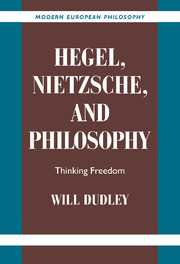Book contents
- Frontmatter
- Contents
- Acknowledgments
- List of Texts, Translations, and Abbreviations
- Introduction: Freedom and Philosophy
- PART I FREEDOM IN AND THROUGH HEGEL'S PHILOSOPHY
- 1 The Place of Freedom in Hegel's Philosophy
- 2 The Freedom of Willing: Hegel's Philosophy of Right
- 3 Freedom beyond Willing: From the Philosophy of Right to Absolute Spirit
- 4 Freedom through Hegel's Philosophy
- PART II FREEDOM IN AND THROUGH NIETZSCHE'S PHILOSOPHY
- Conclusion: Philosophy and Freedom
- Notes
- Index
3 - Freedom beyond Willing: From the Philosophy of Right to Absolute Spirit
Published online by Cambridge University Press: 09 July 2009
- Frontmatter
- Contents
- Acknowledgments
- List of Texts, Translations, and Abbreviations
- Introduction: Freedom and Philosophy
- PART I FREEDOM IN AND THROUGH HEGEL'S PHILOSOPHY
- 1 The Place of Freedom in Hegel's Philosophy
- 2 The Freedom of Willing: Hegel's Philosophy of Right
- 3 Freedom beyond Willing: From the Philosophy of Right to Absolute Spirit
- 4 Freedom through Hegel's Philosophy
- PART II FREEDOM IN AND THROUGH NIETZSCHE'S PHILOSOPHY
- Conclusion: Philosophy and Freedom
- Notes
- Index
Summary
Discussions of Hegel's account of freedom often focus exclusively on the Philosophy of Right. Although everything Hegel has to say in the Philosophy of Right concerns freedom, such an exclusive focus is a serious mistake, for not everything Hegel has to say concerning freedom can be found in the Philosophy of Right. The Philosophy of Right considers the freedom available to spiritual beings through the activity of willing; it presents a detailed account of what Hegel calls objective spirit. Objective spirit, however, constitutes but one-third of Hegel's philosophy of spirit, and we have seen that the entirety of the philosophy of spirit is an attempt to determine what it means to be free. Understanding Hegel's account of freedom therefore requires not only interpreting the Philosophy of Right, but also situating it within its larger systematic context. The goal of this chapter is thus to understand objective spirit in relation to absolute spirit, to understand willing in relation to art, religion, and philosophy.
To accomplish this goal, Chapter 3 employs the same strategy as Chapter 2. Chapter 2 interpreted Hegel's account of the freedom of willing by means of an analysis that emphasized the penultimate conception in the development of the Philosophy of Right; attending to the finitude of the moral will illuminated the ultimate liberation of the willing subject in ethical life.
- Type
- Chapter
- Information
- Hegel, Nietzsche, and PhilosophyThinking Freedom, pp. 69 - 100Publisher: Cambridge University PressPrint publication year: 2002

